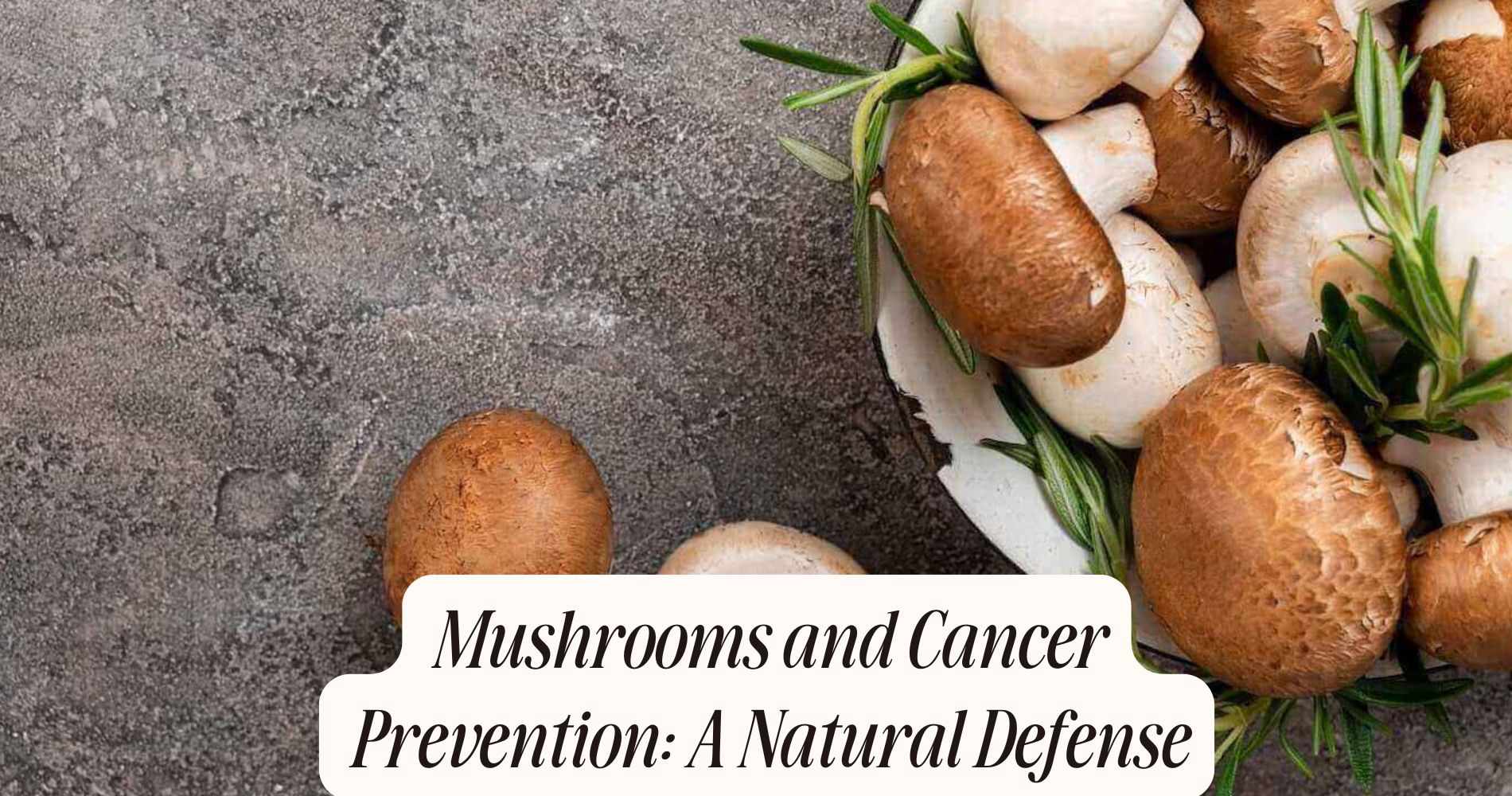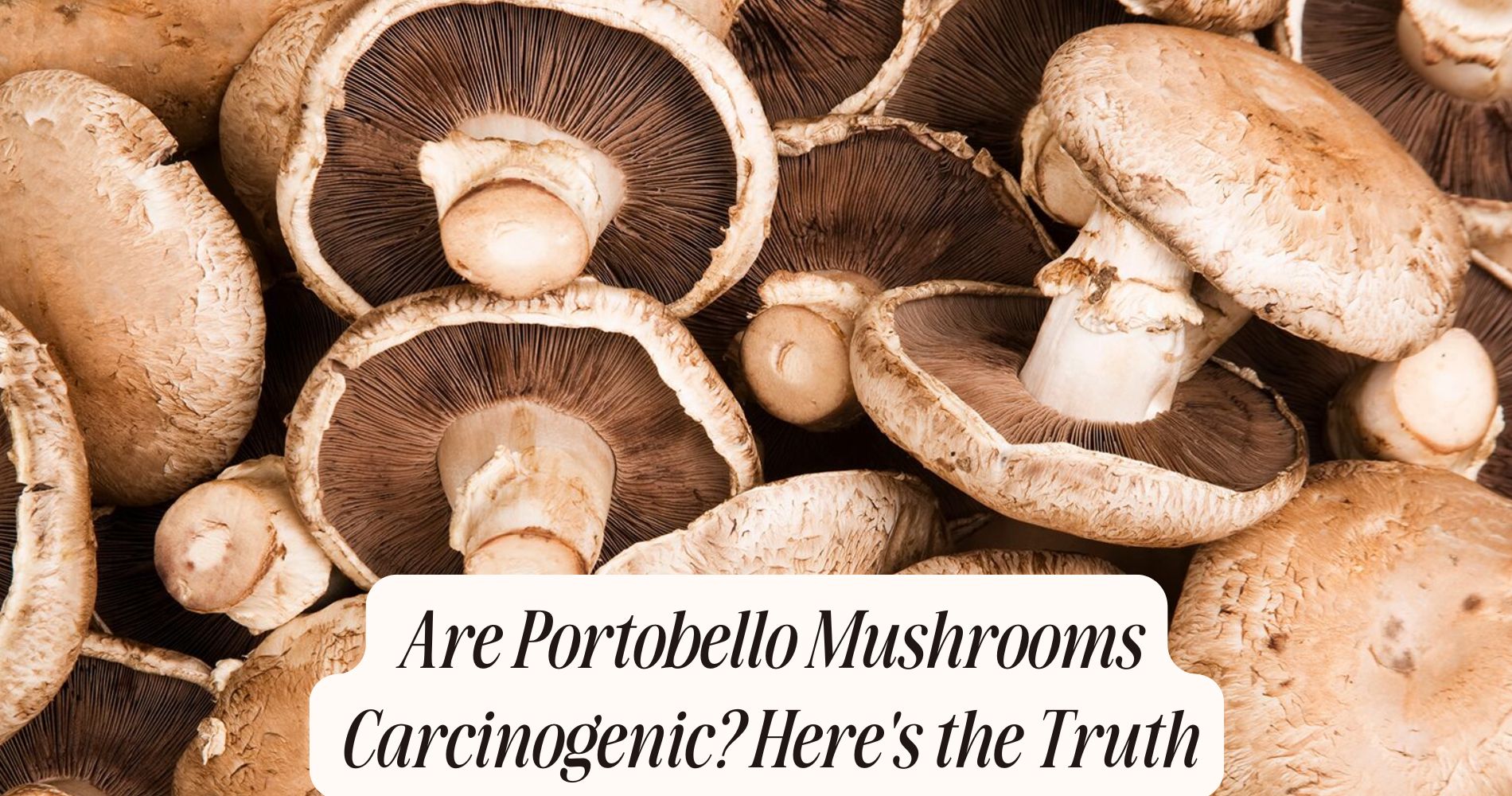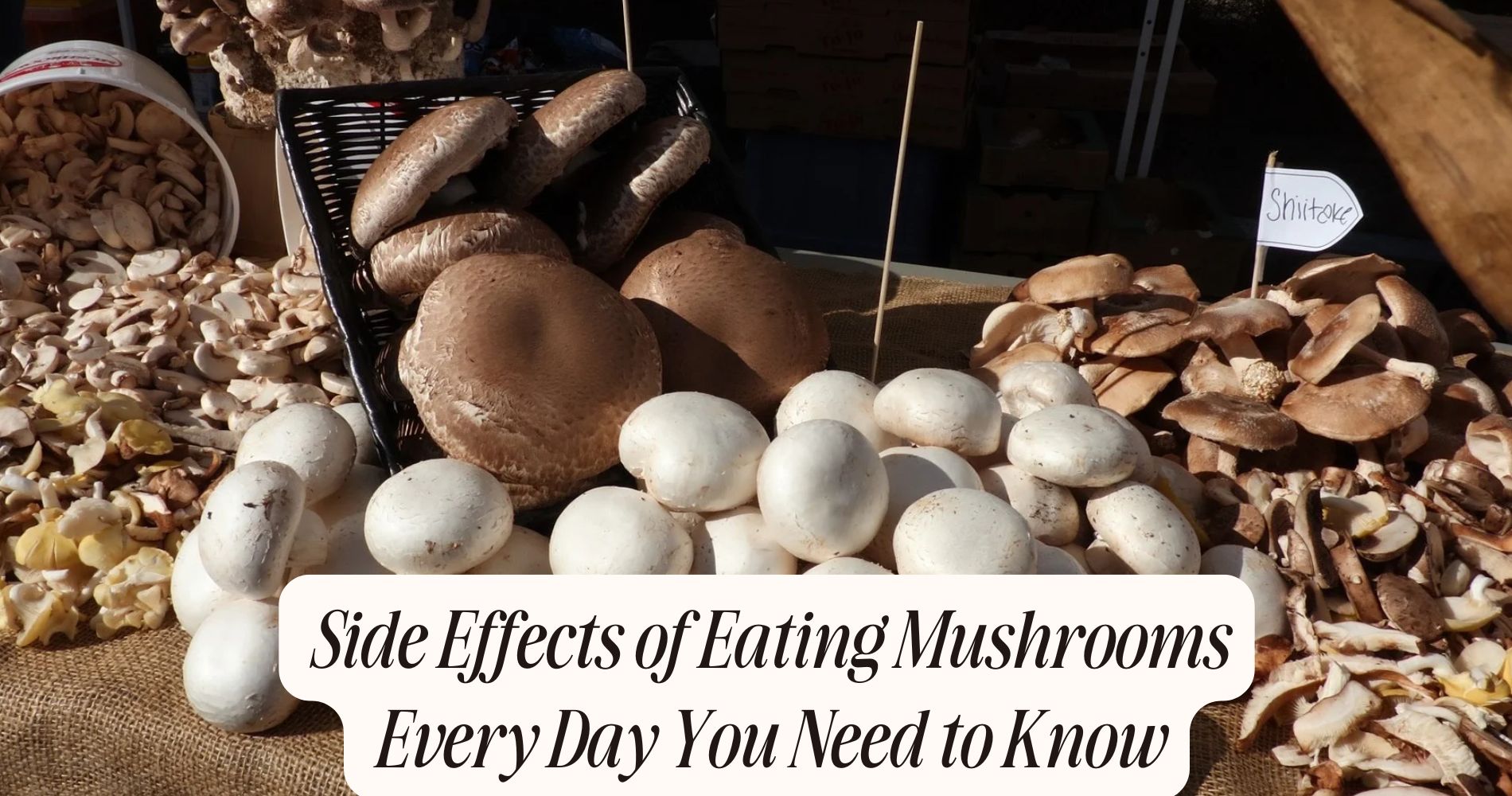
Mushrooms and Cancer Prevention: A Natural Defense
Nutritional Profile of Mushrooms
Mushrooms boast a remarkable nutritional profile that can considerably contribute to a healthy diet. When you explore various mushroom varieties, you'll find that each offers unique benefits, making them a versatile addition to your meals. For instance, shiitake mushrooms are rich in B vitamins, while portobellos provide significant amounts of selenium and potassium.

The nutrient density of mushrooms is particularly significant. They're low in calories yet high in essential nutrients, including fiber, vitamins, and minerals.
A serving of mushrooms can deliver a substantial amount of copper, which is vital for energy production and iron metabolism. Additionally, certain mushroom varieties, like oyster mushrooms, contain significant levels of vitamin D when exposed to sunlight, an essential nutrient often lacking in many diets.
Antioxidants and Immune Support
Mushrooms offer significant antioxidant properties that can help neutralize harmful free radicals in your body.
These compounds not only enhance your immune system but also contain cancer-fighting elements that contribute to overall health.
Understanding these benefits can empower you to incorporate mushrooms into your diet for ideal cancer prevention.
Antioxidant Properties of Mushrooms
The rich biochemical composition of mushrooms contributes greatly to their antioxidant properties, which play an essential role in immune support. Various mushroom varieties, such as shiitake, maitake, and reishi, contain bioactive compounds like polysaccharides, phenolics, and ergothioneine.
These compounds exhibit significant antioxidant mechanisms that combat oxidative stress, a key factor in cellular damage and cancer progression. Antioxidants neutralize free radicals, which are unstable molecules that can cause cellular harm.
For instance, ergothioneine found in certain mushrooms acts as a potent scavenger, protecting cells from oxidative damage. Additionally, the phenolic compounds in mushrooms enhance the body's overall antioxidant capacity, working synergistically with vitamins and minerals to bolster immune function.
Incorporating mushrooms into your diet can be a proactive strategy for reducing oxidative stress and enhancing your body's defenses. By understanding the specific antioxidant properties of different mushroom varieties, you can make informed dietary choices that support long-term health and cancer prevention.
Emphasizing these natural sources of antioxidants empowers you to leverage the unique biochemical profiles of mushrooms for ideal wellness.
Immune System Boosting Effects
Boosting your immune system is essential for maintaining overall health and preventing diseases, including cancer. Various mushroom varieties, such as shiitake, reishi, and maitake, have shown significant immune-supporting properties. These fungi contain bioactive compounds like polysaccharides, which enhance immune cell activity and improve the body's defense mechanisms.

The health benefits of mushrooms extend beyond just immune support. They're rich in antioxidants, which help combat oxidative stress and inflammation—key factors that can weaken your immune response. For instance, ergothioneine, a powerful antioxidant found in mushrooms, contributes to cellular health and supports immune function.
Incorporating different mushroom varieties into your diet can provide a broad spectrum of nutrients and bioactive compounds that work synergistically to bolster immune health. Regular consumption may lead to improved resistance against infections and potentially lower the risk of chronic diseases, including cancer.
Cancer-Fighting Compounds Present
Various mushrooms not only enhance immune function but also harbor cancer-fighting compounds that can play a significant role in disease prevention. Research has identified several mushroom varieties, such as shiitake, maitake, and reishi, as potent sources of antioxidants and polysaccharides, which are essential in mitigating oxidative stress and inflammation—two factors closely linked to cancer development.
In cancer research, compounds like beta-glucans found in these mushrooms stimulate immune responses, enhancing the body's ability to target and eliminate malignant cells. Additionally, the presence of ergothioneine, a powerful antioxidant, further supports cellular health by neutralizing free radicals that can lead to DNA damage.
Moreover, the unique profiles of bioactive compounds in different mushroom varieties provide a synergistic effect, amplifying their cancer-fighting potential. This interplay between antioxidants and immune support positions mushrooms as a valuable addition to a cancer-preventative diet.
Incorporating these mushrooms into your meals could be a strategic choice for bolstering your defenses against cancer. By understanding the specific properties of each variety, you can optimize your health and potentially reduce your cancer risk.
Key Compounds in Mushrooms
Mushrooms contain a variety of bioactive compounds that contribute greatly to their health benefits.
These compounds exhibit potent antioxidant properties and play an essential role in supporting the immune system.
Understanding these elements will help you appreciate how mushrooms can be integrated into cancer prevention strategies.
Bioactive Compounds Overview
While many may not realize it, the bioactive compounds found in mushrooms play an essential role in cancer prevention and health promotion. These compounds exhibit a remarkable bioactive diversity, which includes polysaccharides, triterpenoids, phenolic compounds, and various vitamins and minerals. Each of these components contributes distinct therapeutic potential in combating cancer and enhancing overall wellness.
Polysaccharides, such as beta-glucans, are known for their immunomodulatory properties. They activate immune cells, enhancing the body's defense mechanisms against tumor development. Triterpenoids exhibit anti-inflammatory and anticancer activities, targeting specific signaling pathways that tumor cells rely on for growth and survival.
Additionally, phenolic compounds possess antioxidant capabilities, which mitigate oxidative stress—an underlying factor in cancer progression. Moreover, the vitamins and minerals present in mushrooms, such as vitamin D and selenium, further support cellular health and may reduce cancer risk.
Antioxidant Properties Explained
The antioxidant properties of mushrooms stem from a complex array of key compounds, primarily phenolic compounds, and various vitamins. Different mushroom varieties, such as shiitake, maitake, and reishi, exhibit unique profiles of these compounds, contributing to their efficacy in combating oxidative stress.
Phenolic compounds in mushrooms act as powerful antioxidants that neutralize free radicals, thereby reducing cellular damage. These compounds engage in various antioxidant mechanisms, including scavenging reactive oxygen species (ROS) and upregulating endogenous antioxidant enzymes.
Additionally, vitamins such as C and E enhance these antioxidant effects, providing a synergistic boost to overall health.
Research indicates that the specific antioxidant capacity can vary markedly among mushroom varieties. For instance, oyster mushrooms possess high levels of ergothioneine, a unique antioxidant that protects cells from oxidative damage.
Understanding these differences is essential for optimizing dietary choices aimed at cancer prevention. By incorporating a diverse range of mushroom varieties into your diet, you can leverage their distinct antioxidant profiles to fortify your body's defenses against oxidative stress and its associated risks.
Immune System Support
Incorporating a variety of mushrooms into your diet can greatly enhance your immune system support due to their rich composition of bioactive compounds. Key components such as beta-glucans, polysaccharides, and triterpenes play critical roles in immune modulation.
These compounds stimulate the activity of immune cells, including macrophages and natural killer cells, which are essential for identifying and combating pathogens and abnormal cell growth.
Mushrooms like shiitake, maitake, and reishi have been extensively studied for their health benefits. For instance, the beta-glucans found in these mushrooms trigger immune responses that enhance your body's defense mechanisms.

Additionally, certain compounds in mushrooms possess anti-inflammatory properties, further promoting a balanced immune system.
Research indicates that regular consumption of mushrooms can lead to improved immune function, illustrating their potential as a natural defense against diseases, including cancer.
Research on Cancer Prevention
Research on cancer prevention has increasingly highlighted the potential role of dietary components, particularly mushrooms, in reducing cancer risk. Recent cancer research underscores the significance of prevention strategies that focus on natural dietary sources, with mushrooms emerging as a promising candidate due to their unique bioactive compounds.
Studies show that mushrooms contain polysaccharides, antioxidants, and other phytochemicals that may inhibit tumor growth and enhance immune function. For instance, the presence of ergothioneine and selenium in certain mushroom varieties is linked to antioxidant activity, which can neutralize free radicals and reduce oxidative stress—factors associated with cancer development.
Moreover, specific compounds found in mushrooms, such as beta-glucans, have demonstrated the ability to modulate immune responses, potentially leading to a more effective defense against cancer cells.
Incorporating mushrooms into your diet could serve as a strategic approach in your overall cancer prevention plan. By focusing on these natural food sources, you can take proactive steps toward reducing your risk.
As cancer research continues to evolve, understanding the role of dietary choices in prevention strategies will remain essential for public health initiatives.
Types of Beneficial Mushrooms
Various types of beneficial mushrooms have garnered attention for their potential health-promoting properties, particularly in cancer prevention. Shiitake benefits include enhancing immune function and reducing tumor growth, making them a staple in medicinal diets.
Reishi remedies are known for their adaptogenic properties, which help the body manage stress and may inhibit cancer cell proliferation.
Lion's mane is recognized for its neuroprotective effects, potentially aiding cognitive health while combating oxidative stress.
Maitake magic lies in its ability to boost immune response, particularly through its polysaccharide compounds.
The oyster mushroom offers a rich source of antioxidants, which play a role in neutralizing free radicals linked to cancer.

Enoki effects are notable for their high levels of fiber and antioxidants, contributing to overall gut health and immune support.
Cordyceps uses extend to enhancing stamina and energy, while also exhibiting potential anti-tumor properties.
Chaga properties include powerful antioxidant capabilities, making it a formidable ally against cancer progression.
Finally, turkey tail is renowned for its immune-boosting polysaccharides, which may enhance the efficacy of conventional cancer treatments.
Collectively, these medicinal mushrooms represent a promising avenue for cancer prevention and overall well-being.
Incorporating Mushrooms Into Your Diet
Mushroom integration into your daily meals can greatly enhance nutritional value and promote health benefits, particularly in cancer prevention. By incorporating various mushroom varieties, such as shiitake, maitake, and reishi, you can leverage their unique bioactive compounds. These compounds, including polysaccharides and triterpenes, exhibit immunomodulatory and antioxidant properties, contributing to cancer defense mechanisms.
To effectively incorporate mushrooms into your dietary habits, consider adding them to salads, stir-fries, or soups. This not only enriches your meals but also guarantees you're consuming a wide range of nutrients.
For instance, shiitake mushrooms are rich in lentinans, which have shown potential in inhibiting tumor growth. Maitake mushrooms contain beta-glucans that may enhance immune response, making them a valuable addition to your diet.
Experiment with different mushroom varieties to discover your preferences and maximize health benefits. You can also consider incorporating dried mushrooms, which maintain their nutritional integrity and can be easily stored.
Cooking Methods for Maximum Benefits
Maximizing the health benefits of mushrooms hinges on the cooking methods you choose. Sautéing techniques, for instance, can enhance their flavor while preserving nutrients. Use moderate heat and a small amount of oil to prevent nutrient loss.
Roasting methods also work well; they intensify flavors and maintain beneficial compounds. Steaming benefits mushrooms by keeping them moist and retaining their antioxidants.
For quick meals, explore stir fry options that allow you to combine mushrooms with colorful vegetables, creating a nutrient-dense dish. When grilling, apply grilling tips like marinating to enhance flavor without compromising health benefits.
Consider braising ideas where mushrooms absorb rich flavors while slowly cooking in broth, maintaining their texture and nutrients. Baking styles can be useful too, especially for stuffed mushrooms, allowing you to incorporate various healthy fillings.
Pairing mushrooms with complementary flavors—like garlic or herbs—amplifies their health benefits. Finally, marinating strategies can infuse mushrooms with antioxidants from herbs and spices, further enhancing their cancer-fighting properties.
Personal Stories and Testimonials
Sharing personal stories and testimonials can provide powerful insights into the impact mushrooms have on health, particularly in cancer prevention. Many individuals have documented their health journeys, illustrating how dietary changes—including the incorporation of mushrooms—have influenced their well-being.
Survivor stories often highlight the emotional impacts of cancer, emphasizing how lifestyle shifts can foster resilience and hope. For instance, you might find someone who battled breast cancer sharing their experience of integrating mushrooms into their meals, noting improvements in energy levels and overall health.
These personal experiences can resonate deeply, encouraging others to explore holistic approaches. Community support emerges as a common theme, where individuals bond over shared challenges and victories, reinforcing the idea that dietary changes can serve as a collective strategy for health.
Moreover, testimonials often detail how mushrooms, rich in antioxidants, may play a role in fortifying the immune system. This aspect underscores the importance of making informed choices about food, illustrating how simple additions to your diet can contribute to a broader cancer prevention strategy.
Ultimately, these narratives serve as powerful reminders of the potential benefits of mushrooms in your health journey.
Future Research Directions
In exploring future research directions, researchers must focus on the specific mechanisms by which mushrooms exert their potential anti-cancer effects. Understanding the biochemical pathways influenced by various mushroom varieties is crucial. For instance, studies should investigate how polysaccharides, triterpenoids, and other bioactive compounds interact with cellular processes related to tumor suppression and apoptosis.
Additionally, the diversity of mushroom varieties presents an opportunity for comparative studies. By evaluating the anti-cancer properties across different species, researchers can pinpoint which compounds are most effective and under what conditions. This knowledge could lead to optimized extraction methods and formulations for enhanced therapeutic benefits.

Moreover, large-scale clinical trials are essential to validate the preliminary findings from in vitro and animal studies. These trials should assess the efficacy of specific mushroom varieties in cancer prevention and treatment, considering factors like dosage, administration routes, and patient demographics.
Ultimately, bridging the gap between laboratory research and clinical application will be crucial. By focusing on these areas, you'll contribute to a thorough understanding of mushrooms as a natural defense in cancer prevention, paving the way for innovative dietary recommendations and therapeutic strategies.
Frequently Asked Questions
Can Mushrooms Interact With Cancer Medications?
Mushroom compounds may interact with certain cancer medications, affecting their efficacy or side effects. It's essential you consult your healthcare provider to understand potential medication interactions before incorporating mushrooms into your diet.
Are There Any Risks Associated With Consuming Mushrooms?
When consuming mushrooms, you're at risk of mushroom toxicity if you select wild varieties improperly. Additionally, allergic reactions can occur in sensitive individuals, potentially leading to gastrointestinal distress or severe symptoms requiring medical attention.
How Much Mushroom Consumption Is Recommended for Cancer Prevention?
For cancer prevention, incorporating various mushroom varieties into your diet is beneficial. Aim for a daily intake of about 100-200 grams, balancing types like shiitake, maitake, and reishi for ideal health benefits and nutrients.
Are All Mushroom Varieties Equally Beneficial for Health?
Not all mushroom varieties offer the same health benefits. Some species contain unique compounds that enhance immune function and provide antioxidants, while others lack significant nutrients. It's crucial to choose mushrooms wisely for ideal health outcomes.
Can Mushroom Supplements Provide the Same Benefits as Fresh Mushrooms?
Mushroom supplements can offer benefits, but their bioavailability often differs from fresh mushrooms. You'll find supplement efficacy varies based on processing methods, affecting nutrient absorption. Always consider whole foods for ideal health advantages.
Conclusion
Incorporating mushrooms into your diet can serve as a proactive approach to cancer prevention. Their unique nutritional profile, rich in antioxidants and key bioactive compounds, enhances immune function and may inhibit cancer cell growth. As research continues to reveal the specific mechanisms at play, you'll find a variety of beneficial mushrooms available. By adopting diverse cooking methods, you can maximize their health benefits, paving the way for a more resilient lifestyle against cancer.




